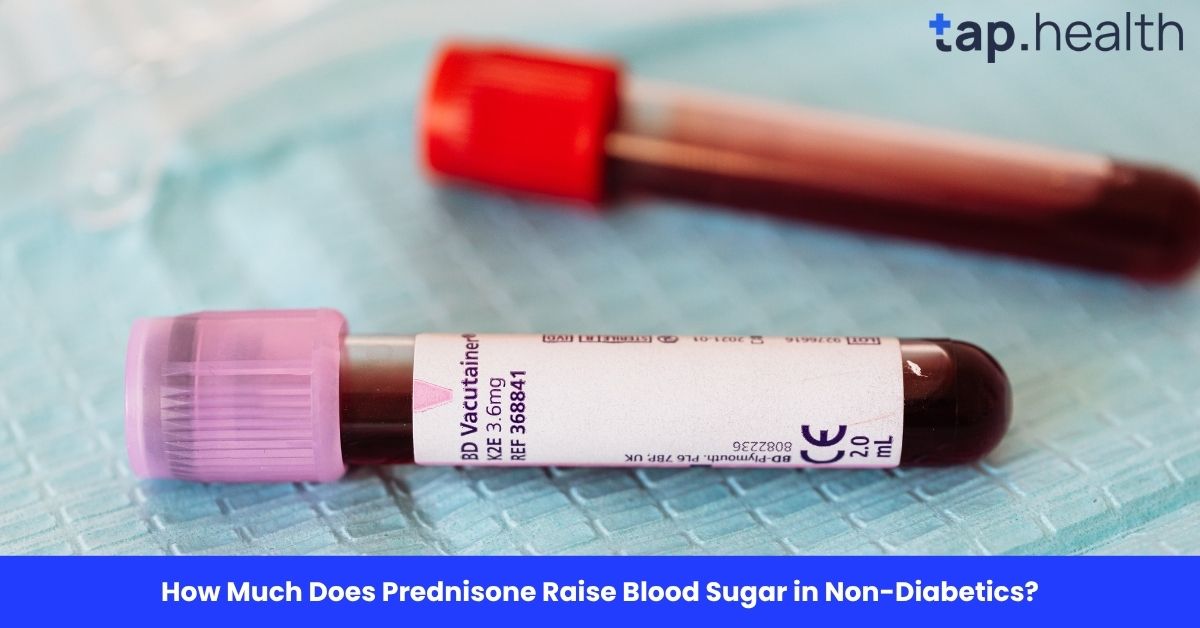You went to the doctor for a nasty chest infection, severe allergy, or perhaps arthritis pain. The doctor prescribed a medicine called Prednisone. You took it, felt relief from the pain or wheezing, but then something strange happened.
You started feeling incredibly thirsty. You were visiting the washroom every hour. You felt tired despite sleeping well.
You might be asking yourself: “I don’t have diabetes, so why do I feel like my sugar is high?”
This is a very common fear for patients across India. Do steroids raise blood sugar in non diabetics? The answer is yes. It is a known side effect that can catch you by surprise.
In this guide, we will explain exactly how much does prednisone raise blood sugar in non-diabetics, why it happens, and when you should worry. We will keep it simple, clear, and medically accurate—just like a chat with your friendly family doctor.
Do Steroids Raise Blood Sugar in Non Diabetics?
Yes, absolutely.
Prednisone belongs to a class of drugs called “glucocorticoids” (steroids). The name itself has “gluco” in it, which stands for glucose (sugar).
Even if you have lived your whole life with perfect blood sugar levels—fasting below 100 mg/dL and post-meal below 140 mg/dL—taking steroids can change that temporarily.
When you take this medication, your body enters a state of “stress.” To help you handle this stress, your body releases extra energy into your blood. That energy is sugar.
The Numbers: How Much Does Prednisone Raise Your Blood Sugar?
This is the most important question. How much does prednisone raise your blood sugar? It depends heavily on the dose you are taking and the time of day.
In a healthy non-diabetic person, blood sugar usually stays between 70 mg/dL and 140 mg/dL. On steroids, you might see these changes:
- Mild Spikes: Sugar levels might go up to 160–180 mg/dL.
- Significant Spikes: It is not uncommon to see levels jump to 200 mg/dL or even 250 mg/dL after a heavy meal.
- Timing: The spike usually happens 4 to 8 hours after you take the tablet.
Let’s break it down by dosage, as many patients ask specific questions about this.
Will 5mg Prednisone Raise Blood Sugar?
Usually, 5mg is considered a low dose. For most non-diabetics, will 5mg prednisone raise blood sugar significantly? Probably not. You might see a very small increase (maybe 10-20 points), but it rarely crosses the danger mark. Your body can usually handle this small amount of extra steroid without trouble.
Will 10mg of Prednisone Raise Blood Sugar?
This is a medium dose. Will 10mg of prednisone raise blood sugar? Yes, it is more likely. At 10mg, your liver starts dumping more sugar into your blood. You might notice you are thirstier than usual. Your post-lunch sugar could touch 160-180 mg/dL. It is usually not dangerous, but it is noticeable.
High Doses (20mg, 40mg, 60mg)
If you are on high doses for a severe condition, your blood sugar can skyrocket. It can easily cross 200-300 mg/dL. This is called “Steroid-Induced Hyperglycemia.”
How Much Does Methylprednisolone Raise Blood Sugar?
Many doctors in India prescribe Medrol (Methylprednisolone) instead of Prednisone. How much does methylprednisolone raise blood sugar? It is slightly more potent. 4mg of Methylprednisolone is roughly equal to 5mg of Prednisone. So, if you are taking a 16mg Medrol tablet, it is like taking 20mg of Prednisone. It will raise your blood sugar just as much, if not more.
Why Do Steroids Increase Blood Sugar? (The Science Simply Explained)
You might be thinking, “I am not eating sweets or drinking cola, so where is this sugar coming from?”
This is the tricky part. Why do steroids increase blood sugar? It is a double-edged sword.
- The Liver Factory: Your liver stores sugar for emergencies. Prednisone tells your liver, “We are in a crisis! Release the energy!” So, your liver dumps stored sugar into your blood.
- The Blocked Door (Insulin Resistance): Normally, a hormone called insulin acts like a key. It opens the doors of your cells to let sugar in for energy. Prednisone damages this key. The insulin cannot open the door properly.
Result: Sugar is pouring into the blood from the liver, but it cannot get out into the cells. So, it piles up in your bloodstream.
Getty Images
How Long Will Steroids Affect Blood Sugar?
The good news is that this is usually temporary.
How long will steroids affect blood sugar?
- Daily Cycle: If you take the pill in the morning (8 AM), your sugar will rise in the afternoon (2 PM – 8 PM) and usually fall back to normal by the next morning.
- Course Duration: Once you stop the medication completely, your blood sugar levels usually return to normal within 24 to 48 hours.
However, if you have been on steroids for months, it might take a week or two for your body to adjust.
Real-Life Scenario
Meet Mrs. Sharma, a 55-year-old homemaker from Pune.
The Situation: Mrs. Sharma has never had diabetes. Her yearly check-ups were always clear. Last month, she developed a severe allergic reaction, and her dermatologist put her on 30mg of Prednisone for 10 days.
The Scare: On Day 4, she felt dizzy and extremely thirsty. She drank 4 bottles of water in an afternoon. Her husband, who is diabetic, checked her sugar out of curiosity. The glucometer read 265 mg/dL. She panicked, thinking, “Oh no, now I am diabetic for life!”
The Resolution: She visited her doctor. He explained that this was a temporary side effect of the 30mg dose. He advised her to cut out rice and sweets for the next 6 days. Two days after her course ended, her sugar was back to 95 mg/dL.
Expert Contribution
Dr. Rajesh Iyer, Senior Endocrinologist: “I see many patients who are terrified when they see high sugar numbers while on steroids. My advice is: Don’t Panic. In non-diabetics, this is a physiological response, not a disease. We treat the sugar if it goes consistently above 200-250 mg/dL to prevent dehydration and infection risks. But in 95% of cases, once the steroid stops, the sugar normalizes. Do not stop your steroid medication abruptly out of fear; the underlying illness (like asthma or severe allergy) is often more dangerous than the temporary sugar spike.”
Recommendations Grounded in Proven Research and Facts
So, what should you do? You cannot stop the medicine, but you can manage the side effects. Here is the answer to “how do i control my blood sugar while on steroids”.
1. The “Walk After Eating” Rule
Research shows that walking for just 15 minutes after a meal helps your muscles use up the extra glucose in your blood without needing as much insulin.
- Action: After lunch and dinner, do not sit on the sofa. Walk around your house.
2. Hydration is Key
When sugar is high, your kidneys try to flush it out through urine. This makes you dehydrated.
- Action: Drink at least 3 litres of water a day. Avoid fruit juices, as they are concentrated sugar.
3. Smart Food Swaps (The Glycaemic Index)
You don’t need a crash diet, but you must avoid foods that spike sugar quickly.
- Avoid: Maida (white bread), white rice, potatoes, sugary tea, biscuits.
- Eat: Roti made of multigrain atta, brown rice, dal, vegetables, paneer, and eggs. Protein helps stabilize sugar.
4. Monitor but Don’t Obsess
If you are on a high dose (over 20mg):
- Check your sugar after lunch or before dinner. This is when steroid spikes are highest.
- Fasting sugar (morning) might still be normal, so checking only in the morning might give you false confidence.
When Should You Call a Doctor?
While mild elevations are okay, there is a danger zone. Seek help if:
- Your blood sugar crosses 300-400 mg/dL.
- You feel confused or have blurry vision that won’t go away.
- You have “fruity” smelling breath.
Sometimes, steroids can “unmask” hidden diabetes. If your sugar stays high weeks after stopping the medicine, you may need a check-up for Type 2 Diabetes.
Conclusion
To summarize: How much does prednisone raise blood sugar in non-diabetics? It can raise it significantly—often between 160 mg/dL to 250 mg/dL—depending on your dose and diet.
But remember:
- It is usually temporary.
- It happens because your liver is dumping energy to help you fight illness.
- You can manage it by drinking water, walking, and avoiding sweets.
Focus on getting better from your primary illness. Your blood sugar will likely settle down once you are healthy again.
Frequently Asked Questions (FAQs) on How Much Does Prednisone Raise Blood Sugar in Non-Diabetics?
1. Will I become a permanent diabetic if I take Prednisone?
For most people, the answer is no. This condition is usually temporary. Once you stop the medication, your blood sugar should return to normal within a few days. However, if you were already “borderline” (pre-diabetic) without knowing it, the steroids might push you into Type 2 Diabetes. That is why checking your sugar 2 weeks after stopping the medicine is a good idea.
2. Can I eat fruits while on Prednisone?
Yes, but choose wisely. Avoid very sweet fruits like mangoes, chikoo (sapota), grapes, and custard apple (sitaphal). Instead, choose fruits with a lower sugar impact like papaya, guava, apples, or oranges. Always eat the whole fruit, never drink the juice.
3. My fasting sugar is normal, but my post-lunch sugar is high. Why?
This is the classic pattern of steroid-induced high sugar. Prednisone usually causes a spike after you eat, not while you are sleeping. That is why testing only in the morning (fasting) can be misleading. You must check 2 hours after a heavy meal to see the real effect.
4. Can I just take an extra diabetes pill to fix this?
Never self-medicate. If you are not diabetic, taking a diabetes pill (like Metformin) without a doctor’s advice can cause your sugar to drop too low (Hypoglycemia), which is very dangerous and can cause fainting. Only a doctor can decide if you need temporary medication.
5. I feel shaky and sweaty. Is my sugar high?
Actually, feeling shaky, sweaty, and dizzy is often a sign of low blood sugar, not high. However, high sugar can sometimes make you feel tired and weird. The only way to know for sure is to use a glucometer. Do not guess; test.
6. Which is worse: the infection or the high sugar?
Usually, the infection or inflammation (like a severe asthma attack) is the immediate danger. High blood sugar for a week is not ideal, but it is rarely life-threatening for a non-diabetic. Do not stop your steroids to fix the sugar unless your doctor tells you to. You need to breathe first; we can fix the sugar later.
References & Medical Sources
1. American Diabetes Association (ADA)
- Topic: Steroid-Induced Hyperglycemia Guidelines
- Relevance: Used to verify the definition of “steroid-induced hyperglycemia” and the specific blood sugar thresholds (typically >140 mg/dL or >200 mg/dL post-meal) that classify this condition in non-diabetics.
- Source: ADA Standards of Care in Diabetes
2. National Institutes of Health (NIH) / PubMed
- Topic: Glucocorticoid-induced Diabetes Mellitus
- Relevance: Cites the study often referred to as “The mechanism of glucocorticoid-induced insulin resistance.” This explains why the liver dumps glucose and why cells resist insulin (the lock-and-key analogy used in the article).
- Source: NIH – Glucocorticoid-induced hyperglycemia
3. The Mayo Clinic
- Topic: Prednisone Side Effects & Dosage
- Relevance: Confirms the correlation between dosage strength (e.g., 5mg vs. 20mg vs. 60mg) and the severity of side effects like fluid retention and high blood sugar.
- Source: Mayo Clinic – Prednisone (Oral Route)


